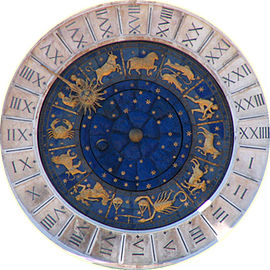 What did your horoscope say today? Did you cancel a trip, avoid making a decision, or check your stock? Some people did, depending on the strength of their belief in astrology.
What did your horoscope say today? Did you cancel a trip, avoid making a decision, or check your stock? Some people did, depending on the strength of their belief in astrology.The National Science Foundation reports that 28% of Americans believe in the predictions of astrology, 18% are not sure, 15% read it every day or quite often, and 30% consult it just occasionally. My suspicion is that many people don't admit to checking it from time to time.
In England, 70% read their horoscopes regularly. The Chinese government has stopped their being delivered by text to reduce the load on the system. Newspapers around the world carry the horoscopes each day.
Some people actually use the predictions to govern their lives. Several presidents and their wives have been known to heed the advice of horoscopes. Mrs. Abraham Lincoln and Mrs. Ronald Reagan consulted astrologers for wisdom and decision making. Even Adolph Hitler used astrology when deciding about timing and war strategy. Some farmers believed in planting in harmony with the phases of the moon.
Astrology is the study of the interactions among stars and planets, and horoscopes predict their affects on humans and world events. The study of astrology can be traced back to Babylon as early as 1645 BC, and horoscopes were seen in 410 BC. The fascination with astrology spread into the cultures of Greece, Rome, Egypt, China, India, Persia, and the Islamic World. Each culture developed its own perspectives and adaptations.
Noted scientists Galileo, Copernicus, and Ptolemy created the theories that later were associated with modern concepts of the study. Astrology should not be confused with astronomy which is scientific study of heavenly bodies and the physics, chemistry, and evolution of such objects.
Over centuries, astrology has had its highs and lows in popularity. With the rise of scientific study during the Renaissance, astrology waned. Renewal of interest came after the birth of Princess Margaret of England in 1930 when newspapers printed her astrological profile. After that, most newspapers started the practice and readers were fascinated.
As time went on, other facets were added like personality traits influenced by the sign under which a person was born. Now prophecies about romance, financial success, and health are part of the picture.
Generally, astrology is not viewed as solid science but is considered by some to be a pseudoscience. While it seems to have some of the characteristics of scientific study, it does not pass the tests for being a pure science.
Though it does make observations about the natural world, it is more about predictions that cannot be measured or tested. The observations made sometimes contradict the laws of physics, and the scientific community in general is not involved with testing the validity of the theories and predictions.
Science is consistent, useful, empirically testable, based on controlled, related experiments, and progressive in nature. Reading horoscopes is better done with an understanding of their fallibility.
No comments:
Post a Comment